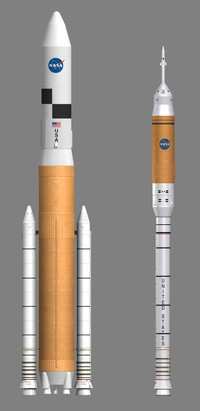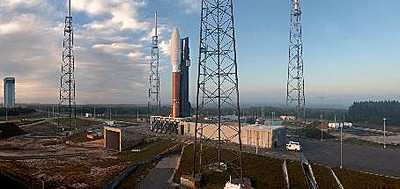Critics Recommend Dropping 'Stick' For Atlas V
 NASA is coming under
fire for a project that has yet to get off the ground... the Ares I
rocket, intended to be NASA's primary manned launch vehicle after
the space shuttle retires.
NASA is coming under
fire for a project that has yet to get off the ground... the Ares I
rocket, intended to be NASA's primary manned launch vehicle after
the space shuttle retires.
Critics encourage dropping the untested "stick" rocket, citing
lack of funding and technical problems among reasons to opt for
using the older, but proven, Atlas V401 instead. That opinion
received a boost this week, with the announcement private space
company Bigelow Aerospace plans to use the very same Atlas
rocket to launch its inflatable space station modules.
As ANN reported, the company
plans to launch 12 manned and unmanned flights starting to 2012,
first sending segments of the inflatable 'hotel' into orbit, then
following with manned capsules carrying paying customers."I don't
think anyone could deny the excellent record and pedigree of the
Atlas V401 as a quality choice to be upgraded to carry human
passengers," company founder Robert Bigelow said earlier this
week.
That opinion is in stark contrast to NASA's prior determination
the Atlas V is unsafe for modification, reports The Orlando
Sentinel. It's also contrary to a 2004 study done at NASA's request
by Lockheed, manufacturer of the Atlas, that showed the Atlas could
be fitted with necessary safety items and other modifications
needed for manned spaceflight relatively inexpensively.
The space agency also contends the Atlas booster does not
currently have the capabilities to lift a future, moon-bound Orion
into space.
While NASA continues its development of the Ares I at Marshall
Space Flight Center in Huntsville, AL, Congress is monitoring said
progress very closely. Last month, reports surfaced the rocket may shake
excessively during liftoff, due to "thrust
oscillation" or a pulsing of thrust late in the burn of the
rocket's first stage. Thrust oscillation is a phenomenon found in
all solid rocket motors, including those used on the space shuttle
-- which are also being used on Ares.
News of the oscillation problem "kind of shook the program,"
said one former NASA official, who asked not to be named. "It's a
horrible pun, but it's true. It really didn't help the
public-relations side of things."
Other NASA insiders tell the Sentinel this shaking syndrome --
and other rumored problems, yet to be discussed publicly -- leave
more than a few people scratching their heads at whether NASA's
Ares program is worth continuing.
Many dissenters are lobbying presidential candidates to abandon
the program outright. NASA officials admit political support for
the Constellation program is shaky, especially given its projected
cost of $26.3 billion between 2009 and 2013, including $7.5 billion
for Ares I.
John Logsdon, director of the Space Policy Institute at George
Washington University, said some criticism of Ares I is justified
-- but other statements seem motivated more by greed and profit. He
fears the uproar could scuttle Constellation in the long run.
"It's not a bad plan," he said, "We just need to adjust it
some."

NASA Administrator Michael Griffin has said before he welcomes
private enterprises interested in developing economical ways to
place humans in orbit. If such programs come online, he said, that
would allow NASA to focus solely on reaching the moon.
 Classic Aero-TV: VerdeGo Debuts VH-3 Hybrid-Electric Powerplant
Classic Aero-TV: VerdeGo Debuts VH-3 Hybrid-Electric Powerplant NTSB Prelim: Grumman American Avn. Corp. AA-5B
NTSB Prelim: Grumman American Avn. Corp. AA-5B ANN's Daily Aero-Linx (12.02.25)
ANN's Daily Aero-Linx (12.02.25) Aero-News: Quote of the Day (12.02.25)
Aero-News: Quote of the Day (12.02.25) Aero-News: Quote of the Day (12.03.25)
Aero-News: Quote of the Day (12.03.25)




